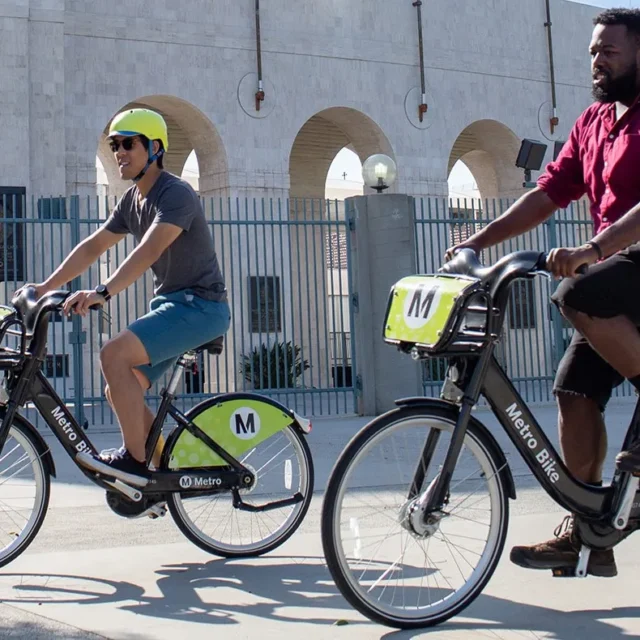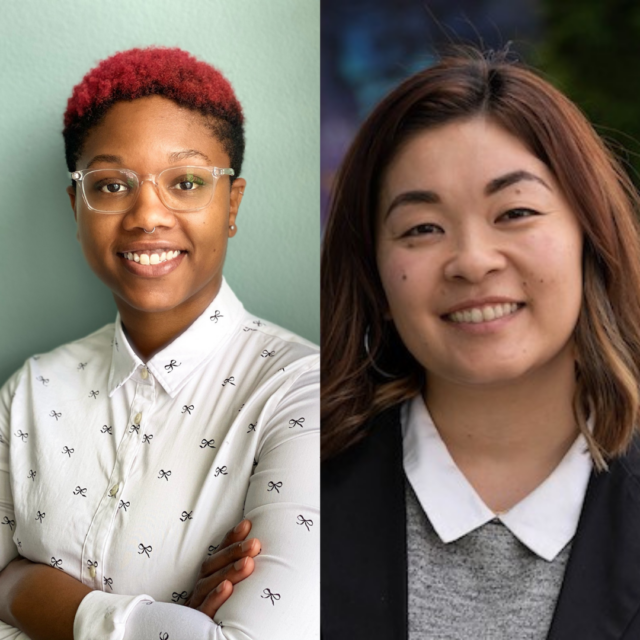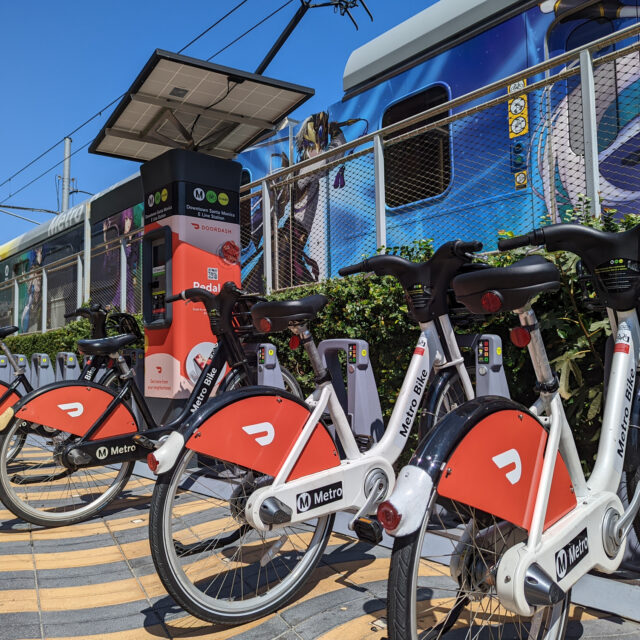Increasing Bike Share for Underrepresented Angelenos
by Kiran Herbert, Communications Manager
October 6, 2023
In Los Angeles, BikeLA has been partnering with Metro Bike Share, Bicycle Transit Systems, and local community organizations to target those often left out of cycling.
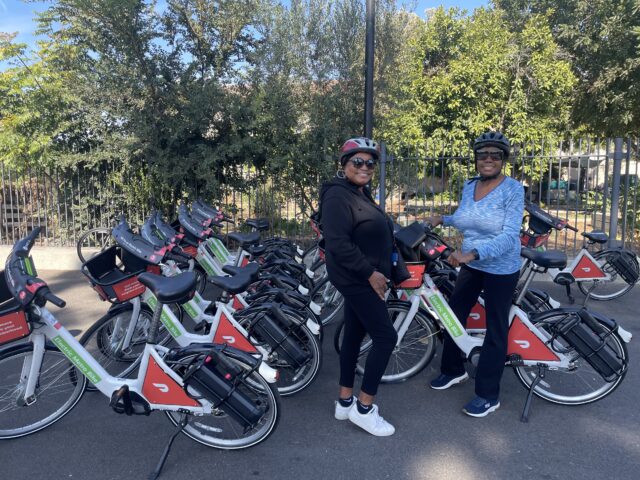
In Los Angeles, Bicycle Transit Systems runs Metro Bike Share, which stands out for being administered by the Los Angeles County Metropolitan Transportation Authority (LACMTA). In addition to shared micromobility, the organization oversees the bus, rail, and subway systems in the metropolitan area. LACMTA’s ridership is huge — think 881,600 people on a weekday — and bike share is just a small piece of the pie, operating in the neighborhoods of Downtown L.A., Central L.A., Hollywood, North Hollywood, and Westwood, as well as the city’s west side.
Unlike transit, bike share is less representative of Los Angelenos as a whole. When folks sign up for Metro Bike Share, their demographic data is collected; user’s demographic data is also collected annually through the Metro Bike Share Annual Survey. When comparing that data to Los Angeles County, it became apparent that Latinx, students, women, and seniors were underrepresented in the system’s ridership. The team saw this as an opportunity to intentionally invite these groups of people to try out the Metro bike share system.
Bicycle Transit Systems and Metro shared their findings with BikeLA, a nonprofit that works to make all communities in LA County healthy, safe, and fun places to ride a bike through advocacy, education, and outreach. Together, the organizations drew up a plan to engage those from the identified underrepresented groups through educational classes and community rides.
“We thought that the best way to access these groups was through community-based organizations, rather than reinvent the wheel,” says Graham Davidson, project manager at BikeLA. “We thought it would be a better idea to go to the communities where they already are, build a relationship, and make sure we’re accommodating their specific needs.”
This past May, BikeLA was one of six organizations awarded a BBSP mini-grant for its project, “Increasing Access to Bike Share for Underrepresented Groups.” As part of the grant, BikeLA began conducting outreach to local community-based organizations, outlining a vision for what their proposed partnership might look like. Each partner organization would collaborate on one class where attendees would receive bike safety education, get a firsthand demonstration on how to use bike share, share a meal from a local business, and take home a helmet and a 30-day Metro Bike Share pass. There would also be the opportunity to participate in a group ride. In order to compensate employees for their time, BikeLA proposed paying the community organizations to participate.
“Some of the people we spoke to were a bit thrown off by the idea of having a free one-time class where they get paid,” says Davidson, explaining that compensation was so unheard of and the bike share system little known, that many thought it was a scam. “Once we met with them and explained the purpose of the grant, they came around.”
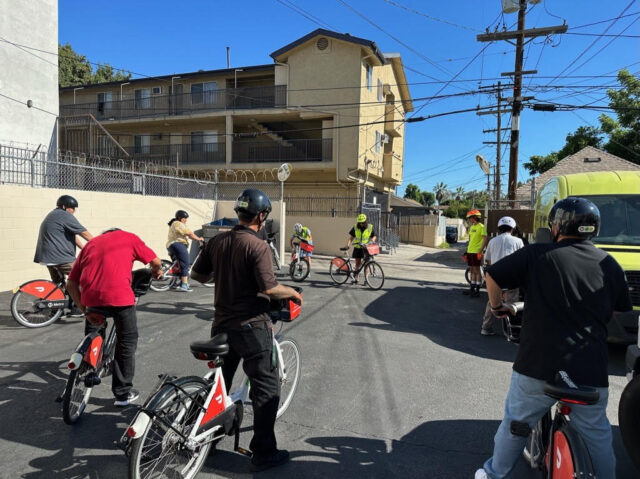
The organizations BikeLA ultimately chose to partner with include Solidad Enrichment Action, which primarily serves at-risk Latinx youth and their families, the Los Angeles LGBT Center, a nonprofit for the LGBTQ+ community, the Little Tokyo Service Center, which is committed to improving the lives of underserved individuals and families, and Homeboy Industries, the largest gang rehabilitation and re-entry program in the world.
All of the classes included representatives from the partner organizations, Bicycle Transit Systems, and BikeLA. While some of the organizations were located further afield from bike share stations, others, like Soledad Enrichment Action, had a station and a park with plenty of safe places to ride nearby. No matter the location, BikeLA made an effort to highlight safe places for people to ride in both its classroom portion and on the group rides.
Each class, which ran about 90 minutes, featured a League Cycling Instructor, who taught basic bike safety, including how to signal, get on and off your bike, and make sure your bike is ready to ride. (Spanish-speaking instructors were available, although all opted for English classes.)
“The instructors we work with are pretty interactive,” says Davidson, adding that they’re also good at remaining open and adapting their material to suit different situations. “They cater to the class and make sure everyone is on the same page with basic bike safety needs. So when we go out to ride, everyone is prepared.”
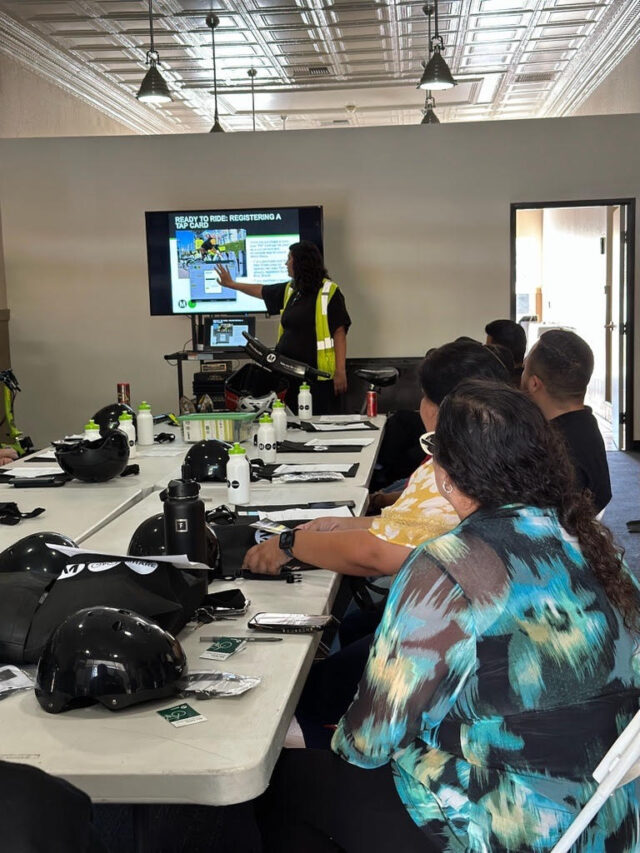 Prior to going out on group rides, participants learned about the rules of the road and some of the basic bike skills specific to bike share. The Bicycle Transit Systems outreach team was on hand to show people how to unlock a bike and easily use the system. Free lunch and helmets were used to draw participants in, while the free month-long passes were intended to ensure they kept using bike share in the following weeks.
Prior to going out on group rides, participants learned about the rules of the road and some of the basic bike skills specific to bike share. The Bicycle Transit Systems outreach team was on hand to show people how to unlock a bike and easily use the system. Free lunch and helmets were used to draw participants in, while the free month-long passes were intended to ensure they kept using bike share in the following weeks.
While the rides were optional, all four community-based organizations opted to include one. For folks new to bike share, the social aspect of group rides holds a lot of appeal, allowing people to get used to bicycling in a supportive environment. Metro Bike Share’s recent annual user survey also showed a strong preference for recreational riding — going forward, the outreach team plans on leaning more toward group rides that focus on recreation and shifting its collateral to showcase people biking together.
In the end, providing each organization with a $500 stipend also proved important, a way to showcase an ongoing investment and establish trust.
“Paying the organizations we’re working with shows that we care — that we’re not just trying to teach a one-off class and have no relationship with them outside of that,” says Davidson. “The stipend is important in showing that we want to be real partners in terms of what they do, not just what we do.”
Going forward, BikeLA, Bicycle Transit Systems, and Metro hope to continue building relationships with the selected organizations, as well as working to continuously bring new partners into the fold.
“We have learned so much about what does and does not work in constructing transformative relationships, and many of our partners have asked what the next steps are in continuing to build trust and access to a more equitable bike share program in Los Angeles,” says Kimberly Fisher, senior marketing coordinator of outreach at Bicycle Transit Systems. “Many partners have given valuable feedback and suggestions for continuing to invest locally and ensure our communities and neighbors are heard and valued — and intentionally invited to the table.”
The Better Bike Share Partnership is funded by The JPB Foundation as a collaboration between the City of Philadelphia, the National Association of City Transportation Officials (NACTO), and the PeopleForBikes Foundation to build equitable and replicable bike share systems. Follow us on LinkedIn, Facebook, Twitter, and Instagram, or sign up for our weekly newsletter. Have a question or a story idea? Email kiran@peopleforbikes.org.

